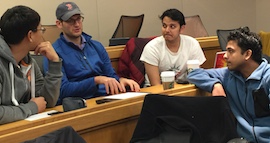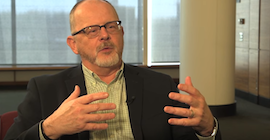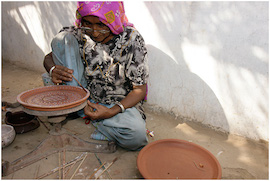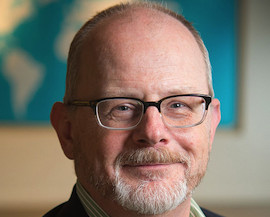This study was undertaken with the financial support of the Inclusive Business Action Network (IBAN). IBAN is a global multi-stakeholder network enabling and promoting inclusive business worldwide. It is implemented by the Deutsche Gesellschaft für Internationale Zusammenarbeit (GIZ) GmbH on behalf of the German Federal Ministry for Economic Cooperation and Development (BMZ).
The focus of this report is to shed light on the opportunity for inclusive business leaders to leverage partnerships to overcome the challenges they face in seeking sustainability at scale. Our findings, based on interviews with both entrepreneurial and corporate-led enterprises engaging with smallholder farmers in Kenya and South Africa, offer important insights on how these enterprises can enhance their performance through building an effective partnership ecosystem. In particular, we focus on addressing the following two questions for IBs seeking to transition from pilot to scale:
The “who” – Which partners should enterprise leaders prioritize as most crucial to enabling sustainable, scalable inclusive business development?
The “how” – Once these inclusive business leaders have identified their priority partners, what are the strategies and processes they will need to use to develop and maintain these relationships to maximize their effectiveness?
The William Davidson Institute (WDI) at the University of Michigan received a grant from Deutsche Gesellschaft für Internationale Zusammenarbeit (GIZ) through its Inclusive Business Action Network (IBAN) initiative to implement the project, “Selecting the Right Partners: Strategies to Support Inclusive Business Scaling.” The project built on prior research supported by IBAN to further understand the process of developing robust partnership ecosystems, specifically in context of Base of the Pyramid (BoP)-oriented inclusive businesses (IBs).
The project was made up of two main stages: Stage 1, Building the Right Portfolio and Stage 2, Partnership Building. During Stage 1, the question, “Which partners should enterprise leaders prioritize as most crucial to enabling sustainable, scalable inclusive business development?” was explored. Stage 2 focused on the question, “Once these inclusive business leaders have identified their priority partners, what are the strategies and processes they will need to use to develop and maintain these relationships to maximize effectiveness?”
The William Davidson Institute (WDI) at the University of Michigan received a grant from Deutsche Gesellschaft für Internationale Zusammenarbeit (GIZ) through its Inclusive Business Action Network (IBAN) initiative to implement the project, “Selecting the Right Partners: Strategies to Support Inclusive Business Scaling.” The project built on prior research supported by IBAN to further understand the process of developing robust partnership ecosystems, specifically in context of Base of the Pyramid (BoP)-oriented inclusive businesses (IBs).
The project was made up of two main stages: Stage 1, Building the Right Portfolio and Stage 2, Partnership Building. During Stage 1, the question, “Which partners should enterprise leaders prioritize as most crucial to enabling sustainable, scalable inclusive business development?” was explored. Stage 2 focused on the question, “Once these inclusive business leaders have identified their priority partners, what are the strategies and processes they will need to use to develop and maintain these relationships to maximize effectiveness?”
Kerry Shields worked in the healthcare industry before coming to U-M’s Ross School of Business for her MBA and has plans to return to it after graduation. So she was eager to find a MAP (Multidisciplinary Action Project) in a different industry, and was ecstatic when she learned she was part of the WDI-sponsored MBA student team working with the Relationship Coffee Institute and Sustainable Harvest in Rwanda.

The Relationship Coffee Institute (RCI) is a nonprofit, public benefit corporation – or, B Corp – working to increase social and economic opportunity for smallholder commodity farmers and their families. Its partner, Sustainable Harvest, is one of the largest importers of fair trade specialty coffee in the U.S.
“What this company is trying to do is important and innovative and I can learn from that,” she said. “Hopefully we will have had an impact at the end of the project and get a better understanding how a private company can help alleviate poverty.”
The MAP in Rwanda is one of eight student projects organized and sponsored by WDI. MAP is an action-based learning course offered at Ross for MBA students who receive guidance from their faculty advisors. Each project requires analytical rigor, critical thinking, and teamwork. Sponsors receive top-notch deliverables and data-driven recommendations from the team of students.
After learning about their projects and conducting research in the classroom for several weeks, the students then spend three to four weeks working alongside their project sponsors in the field.
Sylvia Jimenez will work on a WDI-sponsored MAP team for CARE, a non-profit organization seeking to use business approaches to address social issues.
“I’m looking forward to getting out of my comfort zone and doing something different than I have done before,” she said. “I think I’ll learn a lot about me as a team player, and learn about my teammates and what their strengths are.”
Ted London, vice president of WDI’s Scaling Impact Initiative, is one of the faculty advisors on the Sustainable Harvest and CARE MAPs as well as two others. Before the teams traveled to their destinations for on-the-ground work, he brought them together for a special WDI-focused session to get to know each other better before they left and to touch on some of the key issues the teams will face in the field.
He discussed what it takes to conduct good interviews, particularly in a base of the pyramid (BoP) market context, emphasizing that the goal of these interviews is to develop data-driven recommendations. Among other things, he also told the students to approach people they meet and interview with respect and humility to maximize the depth and quality of the data collected during the interview.
“You are not only there as expert problem-solvers, but also as experts in learning and listening,” he said. “Only by collaborating and co-creating can we build solutions that really work.”
London said his MAP projects allow students to take what they learned in the classroom and apply it in a BoP context.
“For students interested in working in this space as a career, it is an amazing opportunity,” he said. “These MAPs open students’ eyes to this part of the world and to this scale of enterprise and impact. They’re part of the minority seeing how the majority of the world conducts business.”
WDI and its partners get value from the experience as well, London said. Seven of the eight MAP projects are with partners that have long-term relationships with WDI.
“By leveraging MAP and the great skills of the Ross students, we’re providing resources and expertise to our partners to help them solve the problems they’re facing,” London said. “And it’s a way for us to collaborate with partners in the field, apply our knowledge, and learn what are the next-generation tools we need to think about in the future.”
Here is a summary of each MAP project:
Aravind Eye Care System – India
Advised By: Paul Clyde, WDI and Ross School of Business; Peter Lenk, Ross School of Business
MAP Team: Jackie Barnum, Katie Redman, Alex Kravitz, Matt Tafoya
Aravind Eye Care System (AECS) has five tertiary care centers, six secondary care centers, six community clinics, and 54 primary eye care centers across the Tamil Nadu state in India. Now AECS is expanding, opening tertiary hospitals in Chennai and Tirupathi in the next couple of years, and there are also plans to expand the services/facilities in the existing hospital units.
The student team will customize and test at two to three AECS facilities an existing process model that will measure performance of each unit and is understandable to everyone in the organization.
Cooperative for Assistance and Relief Everywhere (CARE) – India
Advised By: Ted London, WDI and Ross School of Business; Jane Dutton, Ross School of Business
MAP Team: Karina Cabanillas, David Chang, Takashi Takizawa, Sylvia Jimenez
CARE has been working in India for over 65 years, focusing on ending poverty and social injustice. Its overall goal is the empowerment of women and girls from poor and marginalized communities leading to improvement in their lives and livelihoods.
Most smallholder farmers, a vast majority of whom are women, have limited access to quality and affordable agriculture input, services, finance and technologies. The student team will develop a profitable and socially inclusive business plan that CARE can execute in 2016 that facilitates access for smallholder farmers to inputs and related services. This should be a commercially viable and financially sustainable approach that avoids donor dependency through the development of an agricultural input supply social enterprise in India.
Sustainable Harvest & Relationship Coffee Institute – United States
Advised By: Ted London, WDI and Ross School of Business; Ravi Anupindi, WDI and Ross School of Business
MAP Team: Stacey Nathan, Whitney Augustine, Erdem Eray, Grant Cowherd
Sustainable Harvest of Portland, Ore. is an importer of high quality, specialty grade coffees from smallholder farmers from 15 countries around the world. In 2012, Sustainable Harvest formed a nonprofit organization, the Relationship Coffee Institute (RCI), to help propagate its business model and advance farmer training. In fall 2015, in conjunction with RCI and 4,000 women farmers in Rwanda, Sustainable Harvest launched Question Coffee, which represents its fundamental goal to empower coffee farmers and foster sustainable supply chains. It is Sustainable Harvest’s first B Corp certified product throughout the entire value chain, meaning it’s a for-profit entity that includes positive impacts on society, workers, and the environment. Net proceeds from Question Coffee go to farmer training, which contributes to better quality, improved yields and increased income and wellbeing for coffee farmers at the base of the pyramid.
The student team will conduct research to identify Question Coffee’s value proposition to consumers, resulting in several specific, actionable recommendations on branding and marketing strategies. The team also will devise several recommendations and strategies for greater market penetration.
Relationship Coffee Institute (in partnership with Sustainable Harvest) – Rwanda
Advised By: Ted London, WDI and the Ross School of Business; Jane Dutton, Ross School of Business
MAP Team: Courtney Landy, Aaron Whallon, Juan Marino, Kerry Shields
For this project, the student team will test and evaluate the value of B Corp certification to see if it could improve the lives of smallholder farmers in Rwanda, and how it could be scaled or applied to other commodities.
Zemen Bank – Ethiopia
Advised By: Paul Clyde, WDI and Ross School of Business; Bob Dittmar, Ross School of Business
MAP Team: Dana Yerace, Max Jacobson, Florence Noel, Nicholas Mencher
Zemen is a commercial bank located in Addis Ababa, Ethiopia. Its vision is to bring new dynamism to the financial sector and the banking business in Ethiopia. It is interested in serving small- and medium-sized enterprises (SMEs). Using a banking scheme in which Ethiopians living in the U.S. could put a hold on some monetary amount in their bank account, Zemen would then access the account for a low interest loan for Ethiopian citizens starting or expanding a small business. The hold on the U.S. bank would be reduced as the loan is paid back.
The student team will develop the business case for diaspora SME loans and assess the prospects for scaling the program to a level that would interest Zemen Bank. If the scheme were deemed viable, then the team would formulate a plan for executing the program.
Imperial Health Sciences (IHS) – South Africa
Advised By: Paul Clyde, WDI and Ross School of Business; Ravi Anupindi, WDI and Ross School of Business
MAP Team: Amit Patel, Jennifer Paxton, Anuja Mehta, Aric Adams
IHS provides supply chain solutions to the public and private pharmaceutical markets in Africa. IHS and the Imperial Logistics group have adopted the Unjani project as its Corporate Social Responsibility project. Unjani aims to establish a network of nurse-owned franchise clinics in historically underserved communities across South Africa. It has 19 operating clinics with plans to add 25 more by May. The group will take over an independent, failing clinic.
The student team will assess the change in the failing clinic’s success level after instituting the processes, controls, training, and marketing of the Unjani franchise network. Examining the operational and environmental factors of the clinic, along with some financial analysis, will allow IHS to better understand why this clinic failed. That will help IHS further develop the Unjani concept and ensure successful clinics in the future.
ITC Ltd. – India
Advised By: Ted London, WDI and Ross School of Business; Venkatram Ramaswany, Ross School of Business
MAP Team: Nishant Agrawal, Kee Cho, Arun Prakash, Dave Teebagy
ITC is a major diversified Indian conglomerate. ITC’s e-Choupal initiative is enabling Indian agriculture to enhance its competitiveness by empowering Indian farmers through the power of the Internet. The initiative facilitates the two-way flow of goods and services in and out of villages, and describes itself as the largest Internet-based intervention in rural India by a corporate entity.
The student team will help ITC design the next version of e-Choupal. The team will deliver a report exploring how the first three versions of e-Choupal have created value and where further opportunities for value creation may exist. The team also will look into how other models of rural farmer engagement are being deployed in other developing countries, identify the various stakeholders impacted, and highlight how the proposed model creates value for them.
Aparajitha Foundation – India
Advised By: Paul Clyde, WDI and Ross School of Business; Jim Walsh, Ross School of Business
MAP Team: Jamyle Michael, Holly Price, Aaron Steiner, Meghan Sheehan
The Aparajitha Foundation is an arm of the Aparajitha Group. It is committed to the cause of creating transformational change in adolescents by using audiovisual technology to deliver life skills training to economically disadvantaged children in India’s Tamil Nadu state.
The MAP team will develop a complete business plan for entrepreneurship education, training and development. The model should be scalable so that it can be used across the country in the future.
Ray Cummings, director of market dynamics for the global nonprofit health organization PATH, recently sat down for a one-on-one video interview with WDI’s Andrea Bare to discuss how it works to improve global health outcomes. The two also talked about Cummings’ career and how U-M students interested in the healthcare field can get involved in global health.

Cummings also spoke to U-M students for the WDI Global Impact Speaker Series on Feb. 17 about how PATH is addressing the challenge of improving coverage rates for many childhood vaccines in low-income countries.
“Ray has deep expertise in healthcare technology development and commercialization in both developed and emerging economies,” said Bare, senior advisor in the WDI Healthcare Initiative’s Market Dynamics group. “He works from the vantage point of several years in biopharmaceuticals business development and partnering, and has brought that expertise to PATH where he has led or contributed to projects for drugs, vaccines, and diagnostics in diseases such as malaria, HIV, and Japanese Encephalitis.”
Cummings’ market dynamics department provides analytical and strategic support for PATH programs that are working with both non-profit and commercial partners to develop new therapies, vaccines and diagnostics for underserved populations around the world. He also has served as commercialization director for PATH’s drug development global program, and senior business officer in its vaccine and pharmaceutical technologies group.
Cummings is the second Global Impact Speaker from PATH. In 2013, Amie Batson, chief strategy officer of PATH, spoke for the WDI speaker series. View a one-on-one interview with Batson here.
Also, PATH has partnered with WDI on several summer internship projects, including 2011 in Bangladesh, 2012 in India, 2013 in Vietnam and Cambodia, and 2015 in the U.S., South Africa, Ghana, and Uganda.
WDI and PATH are currently discussing the scope of a 2016 summer internship with the organization.
Prior to joining PATH in 2009, Cummings held senior business development positions at AVI BioPharma, Inc. (now Sarepta Therapeutics), GD Searle & Co., and Immunex Corp. (now part of Amgen Inc.).
Cummings has a bachelor’s degree in biological sciences from Stanford University, a master’s degree in biochemistry and molecular biology from Harvard University, and an MBA from the University of California, Berkeley.
WDI’s Scaling Impact Initiative is working with Walmart to chronicle what the retail giant has learned from its efforts to include small producers in global supply chains.

The successes, challenges, and lessons learned will become a policy brief and a teaching case, both written by WDI in collaboration with Professor Linda Scott of Oxford University’s Said Business School. Both documents will be published this spring, and are geared toward Walmart and other retailers looking to develop more effective sourcing programs in the future.
WDI Vice President of Scaling Impact Ted London and Research Manager Colm Fay, along with Scott, are studying two Walmart programs.
One is Empowering Women Together, which sources handicrafts from women-owned base of the pyramid businesses in East Africa, Nepal, India and other emerging markets to sell online. The other is Direct Farm, which buys fresh fruits and vegetables from small- and medium-sized farmers to supply Walmart’s stores in Central and South America, Mexico, South Africa, and India.
The team has interviewed managers from Walmart, the Walmart Foundation, and their implementing partners.
This is the second collaboration between WDI and Walmart. Last year, WDI Publishing released a case study on the evolution of a global cross-sector partnership between Walmart and the United States Agency for International Development (USAID). The case looked at what had been gleaned – both positive and negative – during the 15-year collaboration between the two organizations.
The free case, “Walmart and USAID: The Evolution of a Global Cross-Sector Partnership,” focused on partnerships that sought to engage smallholder farmers in the developing world, and highlighted examples from Honduras, Guatemala, Rwanda and Bangladesh. It explored the ways in which these collaborations came about, how they were supported by the partners, and the level of success achieved as measured by Walmart, the Walmart Foundation, and USAID.
The case also identified lessons learned for the future of the Walmart/USAID collaboration, and insights that may apply to the development of public-private partnerships for development more broadly.
In addition, NextBillion’s Kyle Poplin wrote a post on how the case was developed. And Beth Keck, senior director of Women’s Economic Empowerment at Walmart, sat down for a video interview with WDI’s London about the company’s global work.
Image courtesy of Navel Zaveri/Flickr.
Vaccines save 2.5 millions lives annually according to the World Health Organization, and during the past 15 years major strides have been made in coverage rates for many childhood vaccines in low-income countries.

However, challenges remain as evidenced by the 1.5 million children under the age of 5 who still die each year from vaccine-preventable illnesses. Reducing this number will require progress on a range of economic issues related to vaccine procurement funding, reductions in vaccine costs, and economic sustainability of existing vaccine products.
Ray Cummings, director of market dynamics for PATH, will discuss how the Seattle-based international, nonprofit health organization is addressing these challenges as part of the WDI Global Impact Speaker Series.
Cummings’ Feb. 17 talk, “Economics of Global Vaccine Markets and Current Challenges,” will begin at 5 p.m. in Room R2220 at the Ross School of Business. It is free and open to the public.
“Ray has deep expertise in healthcare technology development and commercialization in both developed and emerging economies,” said Andrea Bare, senior advisor in the WDI Healthcare Initiative’s Market Dynamics group. “He works from the vantage point of several years in biopharmaceuticals business development and partnering, and has brought that expertise to PATH where he has led or contributed to projects for drugs, vaccines, and diagnostics in diseases such as malaria, HIV, and Japanese Encephalitis.”
Cummings’ market dynamics department provides analytical and strategic support for PATH programs that are working with both non-profit and commercial partners to develop new therapies, vaccines and diagnostics for underserved populations around the world. He also has served as commercialization director for PATH’s drug development global program, and senior business officer in its vaccine and pharmaceutical technologies group.
Cummings is the second Global Impact Speaker from PATH. In 2013, Amie Batson, chief strategy officer of PATH, spoke for the WDI speaker series. View a one-on-one interview with Batson here.
Also, PATH has partnered with WDI on several summer internship projects, including 2011 in Bangladesh, 2012 in India, 2013 in Vietnam and Cambodia, and 2015 in the U.S., South Africa, Ghana, and Uganda.
WDI and PATH are currently discussing the scope of a 2016 summer internship with the organization.
Prior to joining PATH in 2009, Cummings held senior business development positions at AVI BioPharma, Inc. (now Sarepta Therapeutics), GD Searle & Co., and Immunex Corp. (now part of Amgen Inc.).
Cummings has a bachelor’s degree in biological sciences from Stanford University, a master’s degree in biochemistry and molecular biology from Harvard University, and an MBA from the University of California, Berkeley.
Impact assessment training workshops conducted in Johannesburg, South Africa May 7-9, 2013 and New York City, USA April 15-17, 2013. Funding for these workshops was provided by the Aspen Network of Development Entrepreneurs.
Imperial Health Sciences (IHS) is a leading force in African Healthcare supply chain management. Its mission is to ensure the secure and sustainable supply of quality medicines to the people of Africa. IHS has operations in South Africa, Kenya, Ghana, Nigeria and Malawi with downstream distribution partners providing reach into 26 countries. The student MAP team conducted an impact study and developed a scalable methodology for deploying a direct delivery strategy across South Africa.
RTT Health Sciences is Africa’s largest, privately owned pharmaceutical supply chain management organization. As a South African-based organization with a Pan-African network, RTT offers end-to-end supply chain services through regional and local distribution centers in South Africa, Kenya, Ghana, Nigeria, Swaziland, and Malawi. The student MAP team developed a framework and methodology for benchmarking and mapping the current private sector supply chain. The team also investigated the viability of the regional distribution center model for vaccines in several countries.